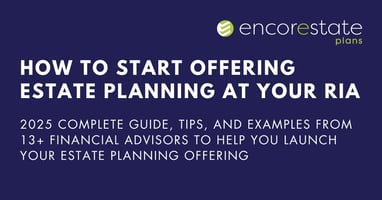Key Takeaways
Avoid Unauthorized Practice of Law: 3 Steps + Examples from Financial Advisors (January 2025)
Reviewed by: Katie Noles, CEP
In this article:
-
What is Considered Unauthorized Practice of Law for Financial Advisors?
-
How to Avoid Unauthorized Practice of Law as a Financial Advisor?
- Why Choose Estate Planning Software Instead of Referring Clients Out?
What is Unauthorized Practice of Law (UPL)?
When someone practices law without a license. Doing so is illegal. Note: every state has different specific definitions of UPL.
For Financial Advisors, Is Creating and Coordinating Estate Plans Considered Unauthorized Practice of Law?
Financial professionals look at legal documents all day.
Your clients have sought financial advice from you in the past, so reminding them of your non-attorney status will not come as a shock (they know you're not an attorney).
Tushar Kumar of Twin Peaks Wealth Advisors put it best when letting clients know he can’t provide legal advice:
"I always position myself as ‘I'm not an attorney. We have this firm [EncorEstate Plans] that are the ones that are actually going to draft the documents. My job is really to help you more clearly understand what your estate planning goals are and then put them down on paper. Someone else is going to do the actual legal document drafting.’
I make it very clear that I’m not practicing law. I rarely get pushback on that. There was one instance that I can remember where I had to explain to someone exactly who Encore is and how it all works. But for the most part, [clients are] okay with having someone that we trust that we subcontract the document drafting to."
Related: How to Provide General Legal Information (and Not Legal Advice)
What is Considered Unauthorized Practice of Law for Financial Advisors?
When financial advisors start giving specific advice to clients’ highly specific questions, instead of general information.
Joel Top of PlanWiser Financial has a pro tip for advisors on how to navigate the estate planning conversation without giving legal advice:
“Education instead of advice. I talk to [clients] about what their options are and let them know we're just helping them [understand] the questions and speak to what's common with other clients, and ‘Here's why.’”
How to Avoid Unauthorized Practice of Law as a Financial Advisor?
Follow these 3 steps to avoid unauthorized practice of law:
Step 1: Clients sign an Estate Planning Agreement
Before creating an estate plan, having this disclosure agreement with clients sets expectations upfront and gets both you and your clients on the same page (literally and figuratively).
These example client estate planning agreements are downloadable (you can also copypaste them into a Word or Google doc).
Step 2: Clients answer disqualifying questions
Disqualification questions will help you avoid UPL. And, they'll help you determine if a client only needs a "basic" estate plan (which is what 75% to 80% of all clients need).
You can use Encore’s disqualifying questionnaire.
Step 3: Clients confirm Plan Summary details
This requires their confirmation that all submitted answers are theirs and 100% accurate.
Upon their approval, Encore adds a time and date stamp on the plan tracking clients' confirmation. You also receive a follow-up email when they have done so.
Why Choose Estate Planning Software Instead of Referring Clients Out?
You should consider using estate planning software instead of referring your clients out when:
- Clients’ estate plans are simple and straightforward to create.
- From what we’ve seen, we estimate 75% to 80% of estate plans are “basic” and don’t fall into any of the disqualification criteria above.
- You’re looking to add more value to your already-established relationships (some clients would rather get a root canal than go through the hoops of vetting someone new and getting all of their info).
- You’re looking to create another line of revenue for your firm by bringing all financial planning offerings “under one roof” (Eric Bishoff of The Bishoff Financial Group has an excellent roadmap for setting up estate planning).
- If the local attorney is not assisting the client with trust-funding, then the trust becomes the most expensive stack of papers they've ever paid for.
- Trusts should be fully funded, and if it is a straightforward Estate Plan, then you are the best person to help them with that.
Note: there will always be clients in your practice that should be sent to your local attorney (both you and your clients will need them from time to time). And, make sure you work with a local attorney who will provide assistance regarding the funding of the trust.




